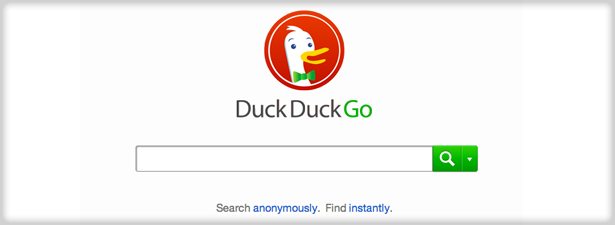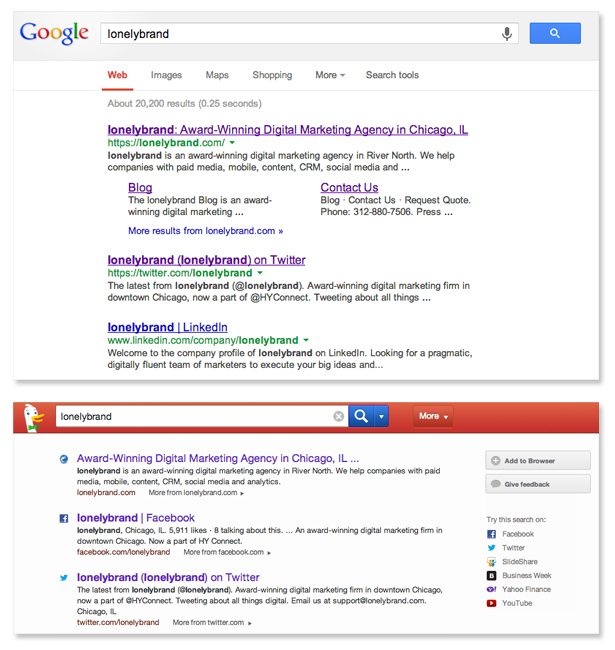 On Tuesday DuckDuckGo proclaimed via Twitter that they had officially hit 3 million daily searches. That’s small beans compared to Google’s 100 billion plus searches per month, but you’ve got to start somewhere when you’re up against a giant, right? Plus, with the recent NSA controversy, pro-privacy DuckDuckGo’s popularity is destined to grow. In case DDG is new to you, here’s a quick rundown on the “alternative search engine” approach and what that could mean for Google-reliant marketers.
On Tuesday DuckDuckGo proclaimed via Twitter that they had officially hit 3 million daily searches. That’s small beans compared to Google’s 100 billion plus searches per month, but you’ve got to start somewhere when you’re up against a giant, right? Plus, with the recent NSA controversy, pro-privacy DuckDuckGo’s popularity is destined to grow. In case DDG is new to you, here’s a quick rundown on the “alternative search engine” approach and what that could mean for Google-reliant marketers.
It took 1445 days to get 1M searches, 483 days to get 2M searches, and then just 8 days to pass 3M searches: https://t.co/u4HCuL2e1W — DuckDuckGo (@duckduckgo) June 18, 2013
What is DuckDuckGo?
Sporting the tagline “Search anonymously. Find instantly.”, DuckDuckGo’s mission is to improve the searcher’s experience through privacy and speed. On the privacy side, DuckDuckGo promises that searches can’t be tracked back to you. For speed they’ve got Instant Answers, which tries to provide a “zero click answer” so users can find out what they’re looking for right there on the SERP.
DuckDuckGo is also steadfastly anti-filter bubble. We know that Google uses your previous searches and clicks to influence future results, effectively filtering the content you find via search. But DuckDuckGo doesn’t track your activity, so each search is a fresh slate no matter which publications you frequent or which politician you’ve searched for. Depending on who you ask, this could be a good or a bad thing.

A few DuckDuckGo considerations for marketers
1. This is still a tiny, tiny fraction of Google’s search volume
Reality check: whether habit, loyalty, ignorance or what have you, most people are going to keep on using Google for the time being and DuckDuckGo will remain entirely off the mainstream radar. So don’t go cutting your AdWords budget or slashing your Google Plus page just yet.
2. Sources
According to the site’s support center, DuckDuckGo gets its results from its own crawler (DuckDuckBot), Wikipedia, Yahoo, WolframAlpha, Bing and Yandex.
3. “Official sites” on top
DuckDuckGo “automatically labels official sites and puts them on top.” The “official site” for each query is determined from other sources like Wikipedia. After several searches, this seems to be a pretty accurate tool but it sounds like smaller sites have had some issues.
4. Logos
The results page pulls in a tiny icon for each result, so searchers will be able to quickly recognize your logo or that of other sites like Facebook, Amazon, Twitter and Businessweek.
5. No next page
If your site isn’t on the first page of Google results there’s a good chance it won’t be seen by the majority of searchers. But DuckDuckGo has infinite scroll, so there’s no “next page” button clicking necessary on the user’s part. That’s not to say that being at top result won’t matter on DDG, though.
6. Social media and DuckDuckGo
Here’s another handy feature. Users can type in their query followed by “!site” to find results on that site. For example I can type “lonelybrand !Facebook” to search Facebook for lonelybrand or “lonelybrand !Twitter” to search my query on Twitter. This will make it easier for searchers to find social profiles, but again, we can’t expect the masses to use more complex search language.
7. Limited advertising
DuckDuckGo has one ad per results page. These sponsored links look a whole lot like the ones you’ll see on a Google SERP and are currently sponsored through Bing Ads. DuckDuckGo is one of Bing’s distribution channels, so if you sign up for Bing Ads and start advertising there, your ads should make their way through DDG.